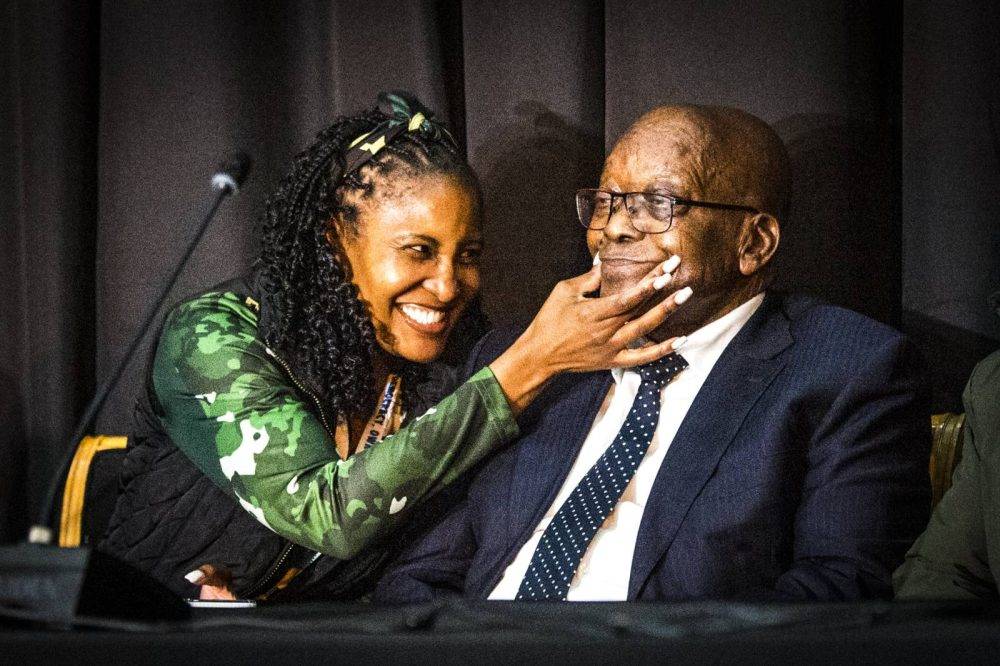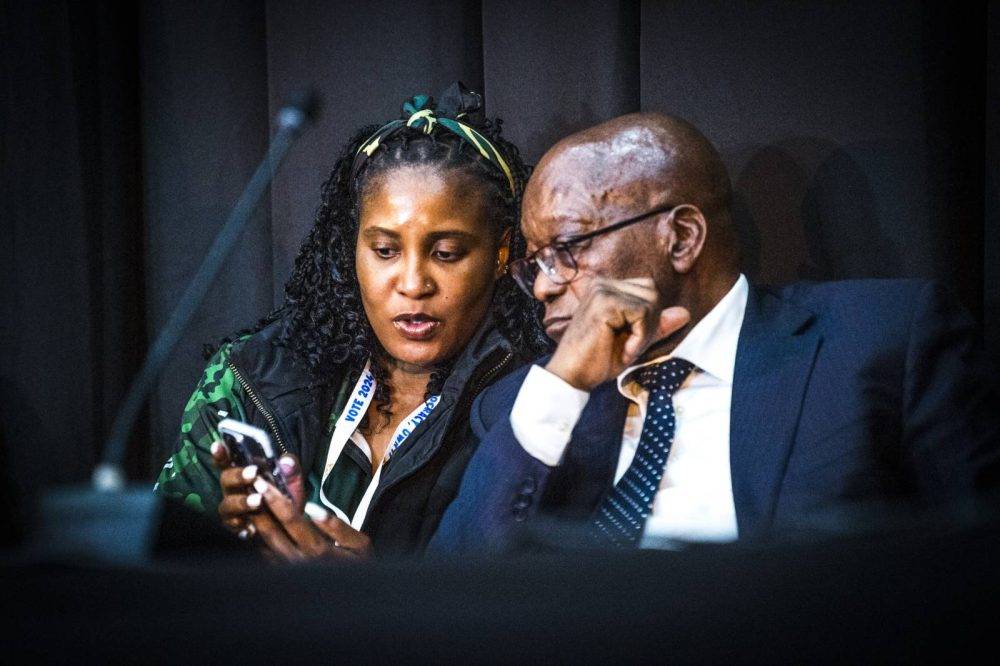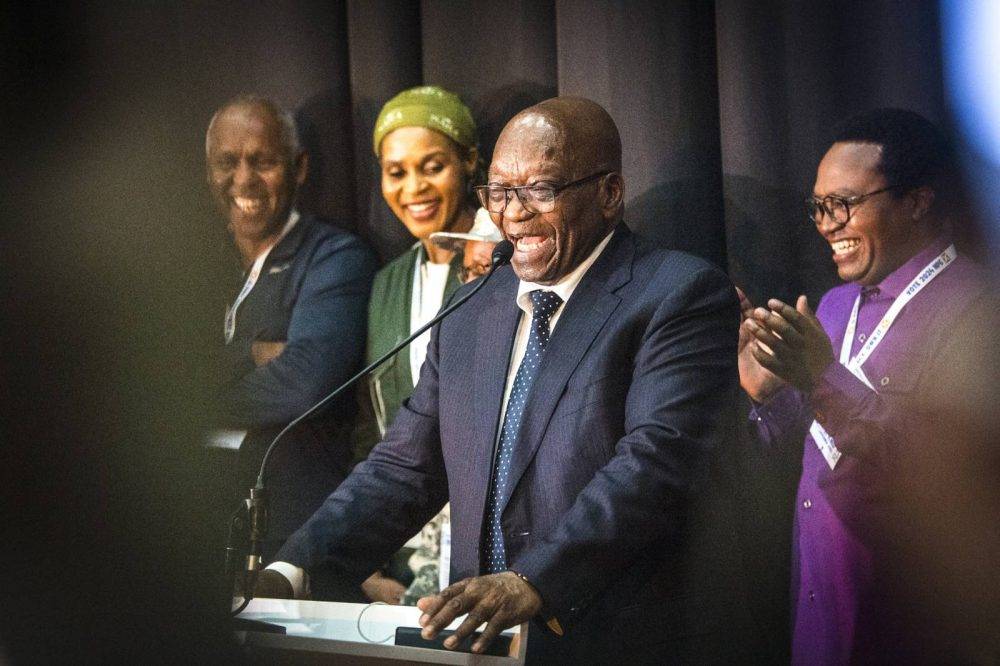MK party leader Jacob Zuma. (Photo by Delwyn Verasamy/M&G)
COMMENT
“Zuma is coming.” The words were a firelighter thrown into the middle of a dense veld.
Reporters spilled out the compact cubicles at the Results and Operations Centre in Midrand. Interviews on the main floor were abandoned mid-conversation; dinner plates in the mess hall were deserted. Every pen, laptop, phone, camera and TV lens was pointed at the entrance, primed for the former president, who had promised nothing but his presence.
Electoral commission officials, smelling the impending mayhem, scrambled to install contingencies. Phones glued to ears, they directed law enforcement to upstairs posts and endeavoured — ultimately in vain — to set up a path their imminent guest could travel with minimal ruckus.
How did the uMkhonto weSizwe (MK) party do so well? That question had lingered uncomfortably in media circles before this point. For a party ostensibly set up sometime last year, but only launched in earnest by Zuma in December, 14.58% on the national board and a commanding 45.93% in KwaZulu-Natal was an incredible result.
We were about to answer our own question. We were about to understand that we were complicit.
The media scrum swarmed the green MK party entourage as it took its first steps into the Gallagher Convention Centre. Zuma’s people formed a phalanx around him, stiff-arming the mob. And then the mass moved as one. A living organism of cameras and shouts with a smiling octogenarian at its heart. The beast rolled through the hall, knocking down computer screens, banners and anything else that stood in its way. People tussled, tripped and clambered over desks — and each other — to get an eyeline of the centre of the chaos. At one point Zuma paused amid the detritus to genially bend down to rescue a reporter’s bag before it was obliterated by trampling feet.
The feeding frenzy was unparalleled.
 Let’s put a smile on that face: Jacob Zuma and his daughter Duduzile at the National Results Operations Centre. Zuma’s party shook up the votes in the 2024 elections. (Delwyn Verasamy/M&G)
Let’s put a smile on that face: Jacob Zuma and his daughter Duduzile at the National Results Operations Centre. Zuma’s party shook up the votes in the 2024 elections. (Delwyn Verasamy/M&G)
No other figure had even approximated such a reaction in the preceding days. The ANC had shelled up, its members reportedly under strict instruction to make themselves scarce after the butchering of their 30-year majority. The notable exception was invariably Gwede Mantashe, whose capricious swings between cantankerous and affable uncle are a reliable feature of these occasions. Democratic Alliance leaders patrolled proudly, happily giving interviews when asked. Julius Malema arrived earlier on Saturday to explain the Economic Freedom Fighters’ stagnant performance (Zuma, incidentally, was to blame, he said) and drew a fair crowd at his presser.
It was all part of the usual pageantry. But in retrospect, the facts of the day read as a prelude to that evening’s main event.
Zuma settled into the press room’s centre chair and the commotion eventually hushed. The MK party, as so many feared, had arrived to denounce the election and demand a revote. They were joined by 25 smaller parties who claimed they had evidence of voting misconduct.
After a Q&A session, there was an excited purr as we were told that Zuma would address the nation.
He rose to the lectern and sardonically began: “I was not meant to say anything, but I said to myself ‘here are my friends, the media’.”

 Former president Jacob Zuma addresses media at the National Results Operations Centre on Saturday. (Delwyn Verasamy/M&G)
Former president Jacob Zuma addresses media at the National Results Operations Centre on Saturday. (Delwyn Verasamy/M&G)
At face value, we know he had laced the greeting with irony — news written about him is indubitably not positive. But there is also a damning level of truth to it. We are friends.
He sells our newspapers, graces our front covers, drives our digital media. We know our audiences are baying for any sliver of an update or just a glimpse of his face — whether out of hate or love.
The relationship is mutual. Our coverage drives his legend. He undoubtedly has long understood that how we portray him has little consequence. If anything, criticism only feeds his narrative of a man striving against persecution and gives him ammunition to act the victim when he is hauled into court.
He knows one phone call is all it takes to send us into delirium. And he knows how to operate us when we arrive.
It was a remarkable, if perverse, achievement to witness. No one in the press room had any illusions about the gravity of what Zuma was doing. His protest pulled at the very seams of our democracy and endangered its legitimacy. We believed him when he said there would be “trouble” if he was not taken seriously. We all fear what that could mean. And yet he injected an aura of levity into the space.
His voice was not boisterous, but calm, smooth and beguiling. He spoke in terms of “us”; calling on the nation to unite against what he saw as an injustice. The smatterings of cheers and claps loudened as he threw more dispersions at the Electoral Commission of South Africa; many came from party members, but journalists worried aloud afterward whether some of their colleagues had been caught up in the moment. When Zuma is in full form, firing out quips and getting back laughs, allegiances are not always conspicuous.
It was a shameful spectacle to be a part of.
But there can be no finger-pointing here. We all must take collective responsibility for how the circus played out — not just those of us who took part in the melee that day. Obsession can be just as harmful as sycophancy.
How do we avoid a repeat calamity? What is the appropriate level of coverage we should give? Those aren’t easy questions to answer. The literal trials and tribulations of a former president are not something we can ignore. But it can’t be this. For the sake of our nation, we cannot be friends.